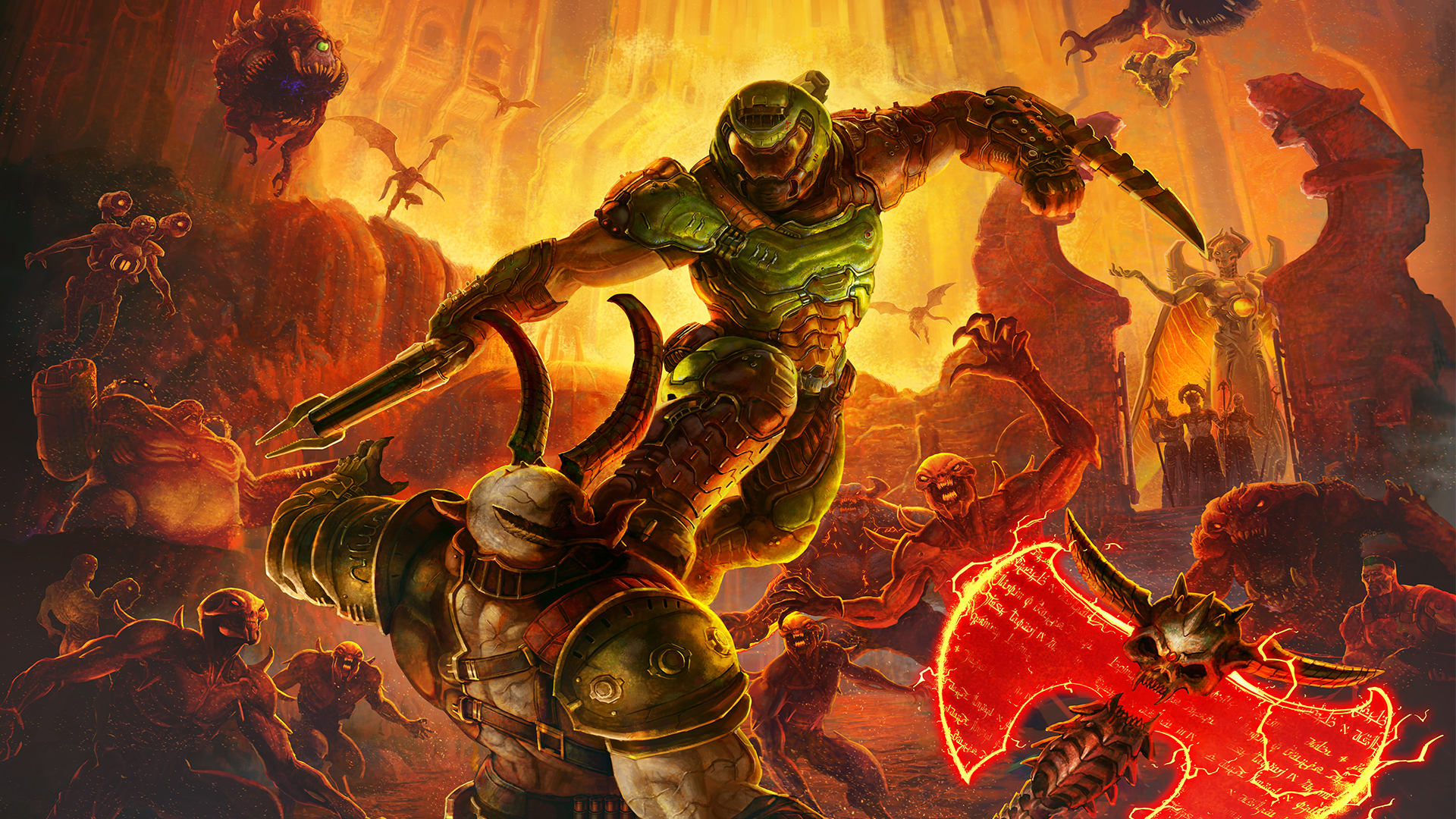GamesRadar+ Verdict
Doom Eternal is a smart iteration of what came before it that occasionally stumbles under its own desire to evolve
Pros
- +
Combat is fast and frantic
- +
Visually stunning
- +
It's still fun to rip demons apart
Cons
- -
Platforming sections are frustrating
- -
Struggles when it forces you to slow down
Why you can trust GamesRadar+
Doom Eternal is at its best when it is screaming at you to move faster. As it thrusts the tools to single-handedly eviscerate the rampaging spawn of hell into your clenched, blood-drenched fists – an array of finely-tuned weapons designed to deliver mass-demon-destruction. When you're up to your ankles in viscera, blasting chunks of flesh from foe while the hum of the chainsaw warms your trigger fingers. As it sets its hyper-kinetic action to a cacophonic soundscape of blood, bullets, and heavy fucking metal.
Doom Eternal screams at you to move faster and to fight harder and you can do nothing but obey. Not because you have become subservient to the altar of id Software, but because the cadence of Doom's combat has demanded nothing less of you for more than three decades.
Doom Eternal Tips | Doom Eternal Slayer Gates | Doom Eternal Computer password | Doom Eternal BFG | Doom Eternal Cheat codes
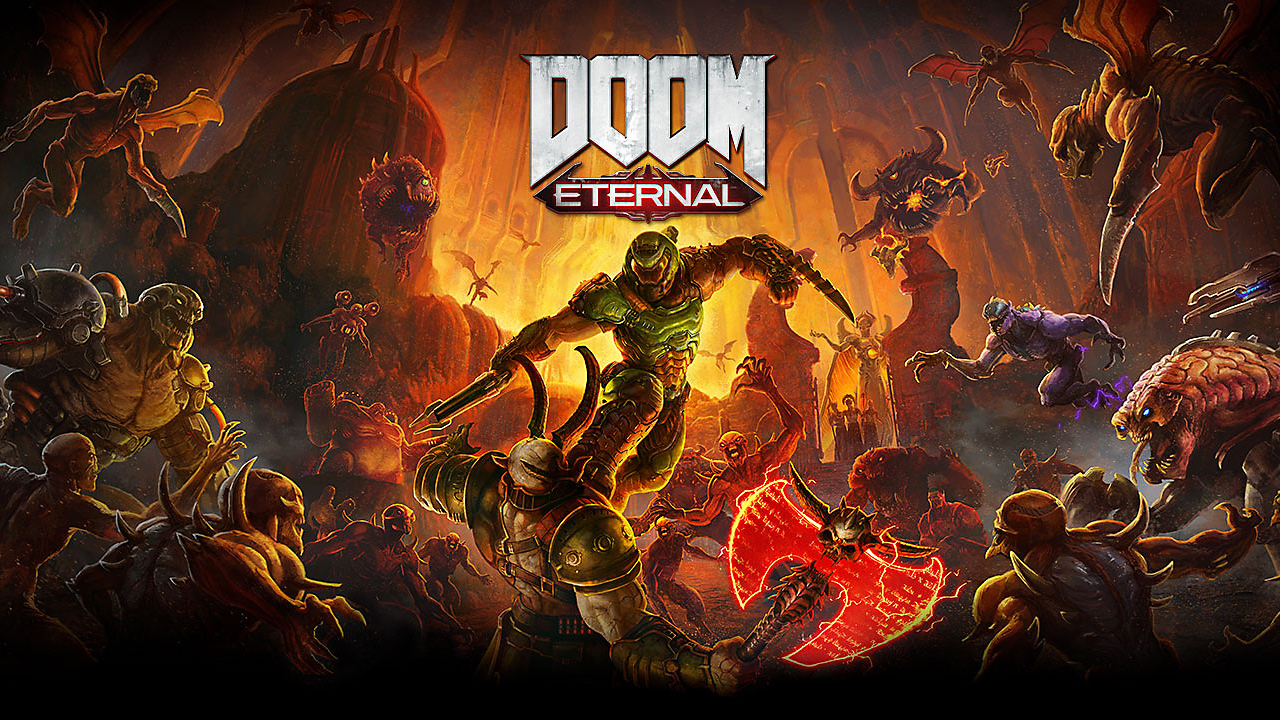
Release date: March 20, 2020
Platform: PC, PS4, Xbox One
Developer: id Software
Publisher: Bethesda
Much like its predecessors, Doom Eternal is a hammer-horror pantomime in which you are made an active participant. It is an elaborate and self-indulgent production, its violence so over the top that you can't help but smile as it spills out over the stage and under your feet. It's an utterly ridiculous and strangely endearing showing, warping your suspension of disbelief so extensively that you'll wonder whether you've crossed over to another dimension – to a world where the first-person shooter followed the archaic directions first outlined by Doom in 1993 without question instead of turning toward the teachings of Half-Life.
The problem with this stage show is that the screaming has to stop sometime. The director is hoarse and is begging you to enjoy an intermission from the action. The bullet casings need to be collected, they tell you; the buckets of blood need to be refilled, the gore mopped up, and the guitars tuned back down to D. The cast of cannon fodder needs to take a breather as the next hellish stage is reset somewhere out of sight. You were moving too fast, and there's still a little story left to shout into your face.
Doom Eternal is at its worst when it makes you slow down; it struggles to settle in silence.
Feeling a need for speed
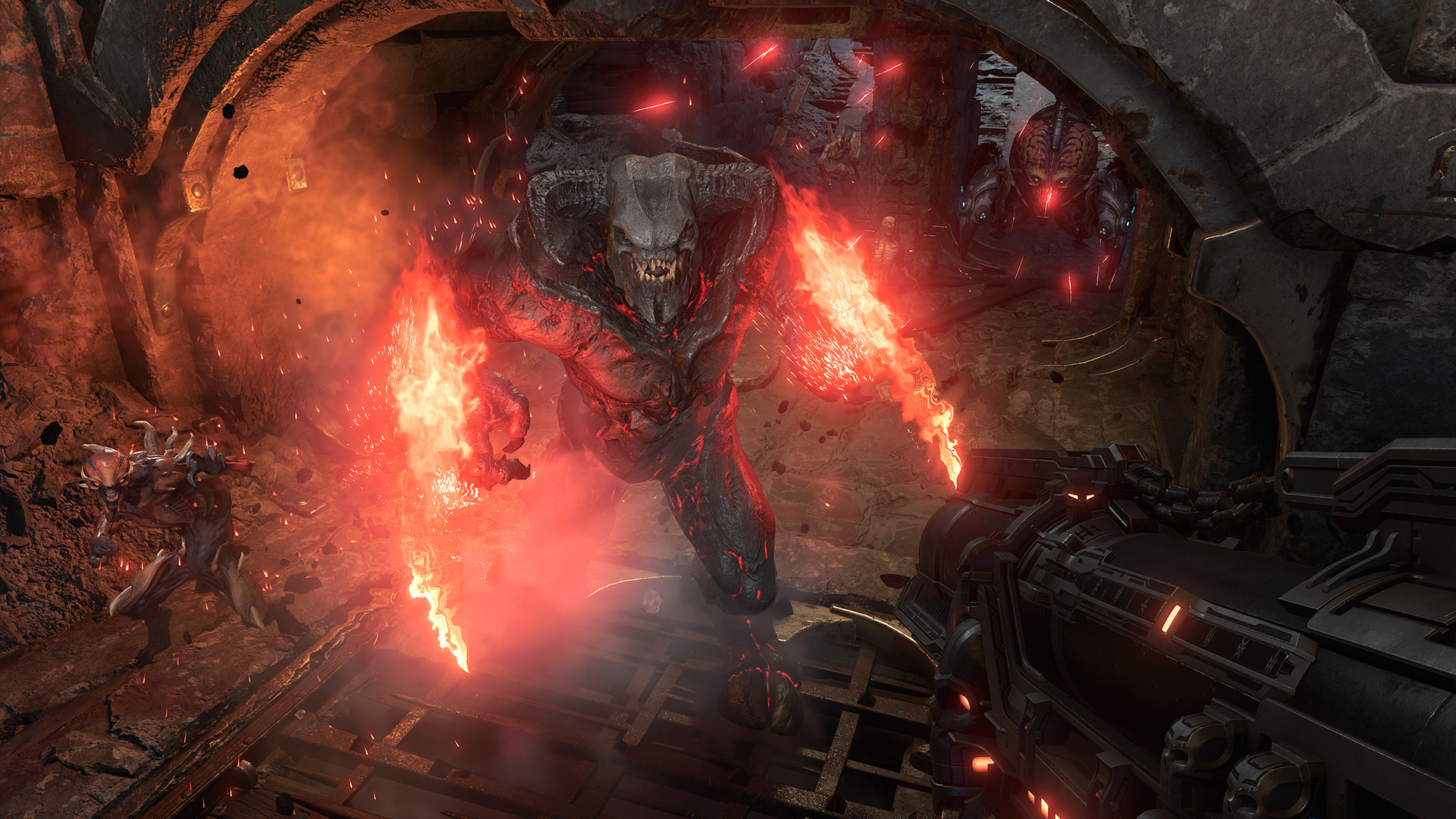
I can count the number of first-person shooters that can function competently as platformers on one hand, and Doom Eternal is not among them. Developer id Software has found itself caught, by attempting to straddle the line between inducing nostalgia and embracing evolution it has disrupted the conditions in which Doom (2016) was able to so effortlessly thrive.
Doom Eternal routinely breaks the pace of its action by forcing you to stiffly navigate towering spaces at regular intervals. You'll do this by swinging imprecisely between monkey bars, scaling bland craggy walls, bouncing off of unstable platforms, dashing between spacious maws of death, and double-jumping to ledges with slippery collision detection. Doom's movement systems are tightly refined, designed to keep your crosshairs focused on fast-moving enemies amongst a backdrop of colourful chaos. These systems struggle when you're pushed to slowly and methodically scale the environment with little room for error to reach the next combat arena.
It's levels like Doom Hunter Base, Super Gore Nest, and Mars Core that make up the bulk of the mid-game that are hit hardest by this design decision. These spaces are larger and more ambitious than anything the studio has committed to before with Doom, and they struggle to maintain momentum.
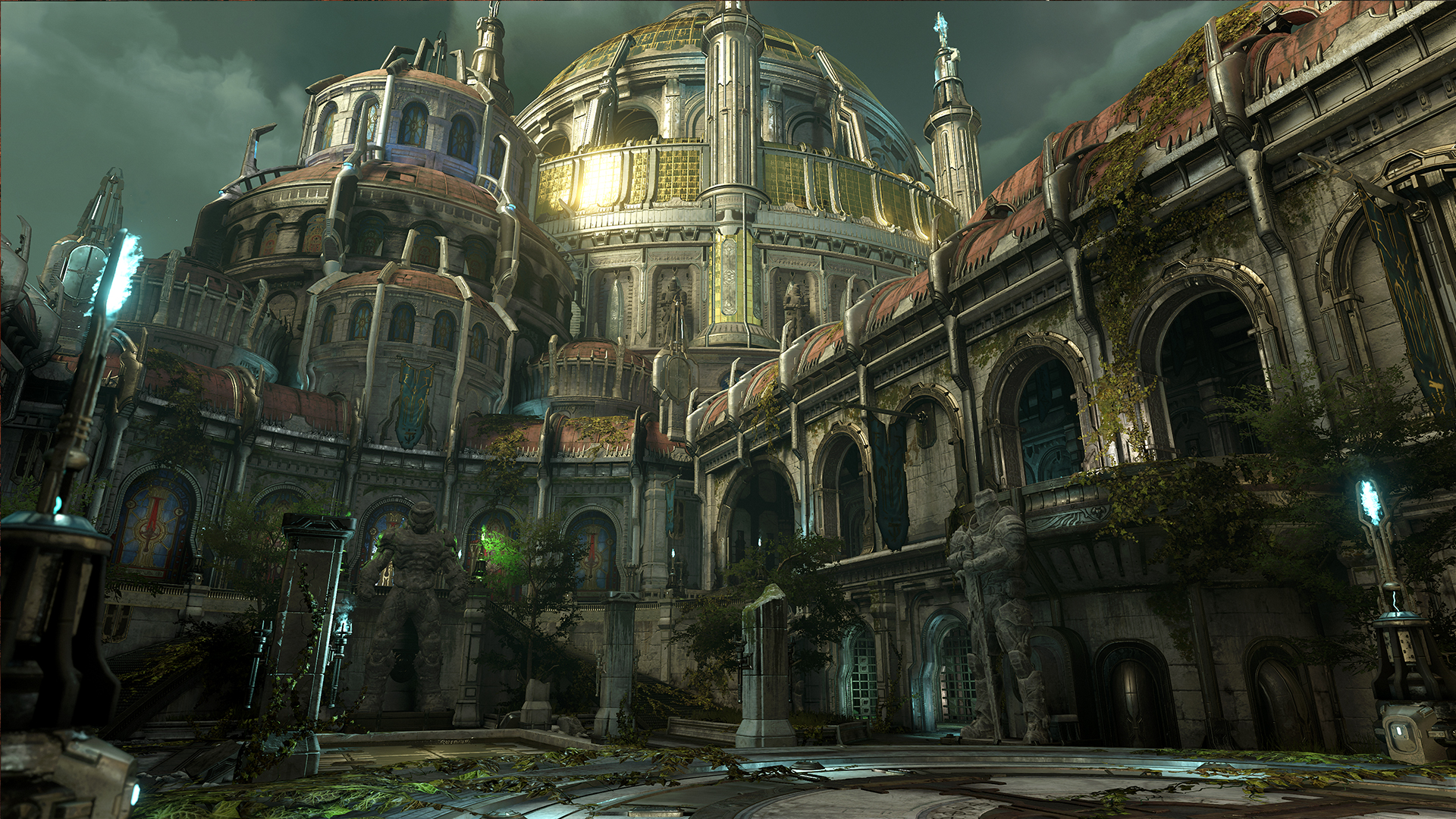
"As a prerequisite to progression, platforming only serves to introduce points of friction in an otherwise frictionless experience."
First-person platforming just about works for Doom when it is an optional extravagance – when you're off exploring for the myriad of optional collectable scattered throughout each of the missions – but as a prerequisite to progression they only serve to introduce points of friction in an otherwise frictionless experience.
By the time underwater sections were introduced – slowing you down even further, with the added annoyance of mitigating radioactive damage thrown in for good measure – it starts to become difficult to resist the urge to put the controller down and walk away entirely. That all said, it's difficult to indulge in these tendencies when you're faced with the prospect of coming across another sensationally-realised vista or the opportunity to shove the Super Shotgun double-barrel deep into the throat of a Baron of Hell.
That's where Doom Eternal feels right, revelling in ultra-violence across some impossibly beautiful environments. The game has built on the core loop that helped propel its predecessor from mere revival-project to genuine revolution, its central gimmick always working to keep players moving and – critically – engaging with enemies.
Embracing aggression

Glory Kills are still the star of the combat experience. Pumping enemies with enough bullets to reach a damage threshold will make them glow, indicating that you can do some graphic combination of: decapitation / goring / smashing / bashing / slicing / knifing / ripping / tearing (delete as necessary). These melee executions aren't just for show, they serve as your primary method of retrieving health.
It encourages you to play Doom Eternal the way id wants you to play it. The studio wants you to be moving and shooting as quickly as you can, giving as much aggression back to the hulking monsters as they give to you. To succeed in Doom Eternal – especially once you begin to whip through the difficulty levels – you must get in the face of enemies and never back away from a tough encounter; there's no faster way to meet your maker than to engage in a half-hearted retreat, with victory earned by engaging with the relentless pace of the action on its own terms – backing off is never an option, carrying through with forward momentum towards piles of ammunition, red barrels, and, yes, fresh enemies to rip and tear through is the key to victory.
If you aren't in need of health, you'll find that your Chainsaw can be used to chew through foes and retrieve ammunition, which is always in short supply. Your flame belch, a shoulder-mounted flamethrower, can burn enemies and deliver armour plating when shot, while Glory Kills also charge up your ability to deliver a devastating Blood Punch which eviscerates just about anything within your immediate cone of vision. All in all, it's a killer cycle that only helps propel Doom Eternal's core combat to new heights.
Speaking of the core combat, it's been a long-standing rule that you judge an id shooter on the strength of its shotguns. Unsurprisingly, the studio has taken its penchant for building the best boomsticks in video games and outdone itself. The Super Shotgun is impossible to put away; it screams power with every shot, its weight and staggering punch as satisfying to use the opening hours of the game to the last.
Weapons have always been at the heart of Doom, and Eternal is no slouch in this regard. You'll also find that each of the firearms can once again be upgraded throughout the game with Weapon Points, earned by completing in-mission objectives and chaos thresholds. Most weapons have two available modifications, each of which can be switched up with a simple button press, and offer an array of utterly ridiculous additional ways to turn demons to pulp. Exploring the environments will also help you earn Sentinel Crystals and Praetor Suit points which can be used to upgrade your armour, improving its utility and resistance, or upgrading your health, armour, and ammo capacities.
A celebration of ultra-violence
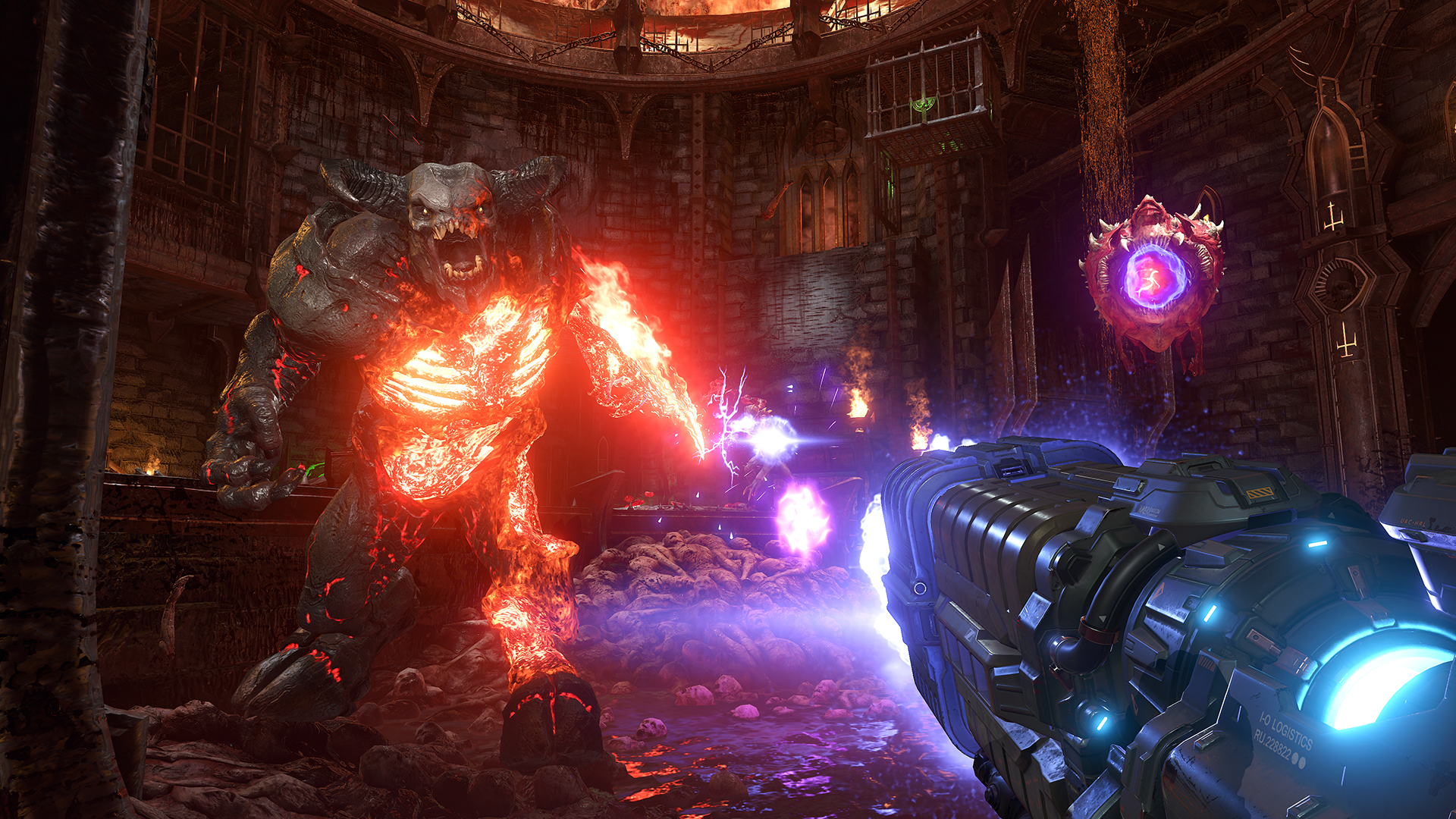
You'll want to invest in these upgrades and improvements early on, because Doom Eternal isn't afraid to beat your head against the wall until it's a pulpy mess. By the late game, Doom Eternal gets brutal, really pushing you to utilise all of your available abilities and weapons to get through its combat arenas in one piece.
For the most part, Doom Eternal casts its action in locked-off combat arenas, pushing you to skirt through them at speed looking for the most violent lines of none-stop navigation. These spaces aren't as tightly designed as the ones featured in Doom (2016), which I believe is down to the increased verticality – id is desperate to get you utilising its first-person platforming systems, even in the middle of frantic fights – but they are still great to engage enemies in.
That said, Doom Eternal does suffer because of some of its enemy design. The game is structured around escalating encounters – it introduces you to an enemy type on its own, lets you figure out the hook to slaying it, and then continues to throw a litany of them at you once. It's a potent design that keeps Doom Eternal feeling frantic at all times, with the game's aggressive and persistent AI ensuring that some of these creatures combine tactics to overwhelm you in some truly terrifying ways.
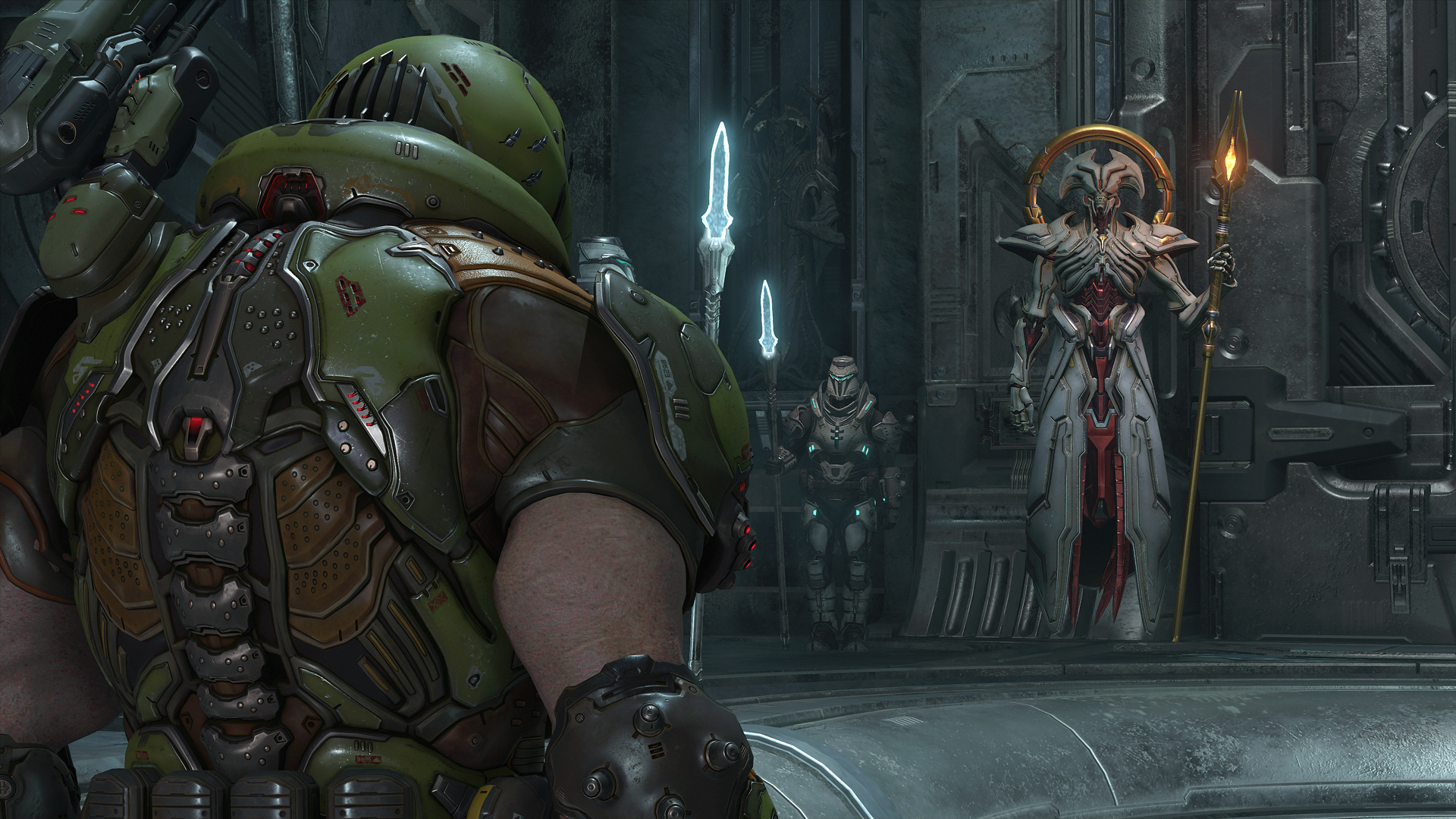
Combat arenas are usually a mixture of Heavy Cannon fodder – foes that can be quickly chewed up or smashed down for an easy burst of ammo or health – and larger, more punishing enemies that'll take a few runs around the arena to drop. This structure maintains momentum, and the relentless pace that the core ethos that the game is built on. Until it makes you slow down.
Boss battles with health bars were a blight on Doom (2016), and while that isn't so much of a problem here, there are a handful of enemy types that bring play screeching to a halt. For Doom Eternal to work, it has to have you managing your time between multiple enemy types and constantly leaving you on the verge of being totally overwhelmed, constantly asking you to push your understanding of the movement and combat mechanics to the max. And in comes a Marauder (a brand new demon designed for Eternal) or a returning Archvile, Super Heavy enemies that are generally no fun to fight. The Marauder, in particular, only works to slow combat to a crawl. It's an enemy type designed inherently for one-versus-one encounters, and it doesn't work in the controlled chaos of the wider combat experience.
Still, that's a small annoyance in an otherwise blistering FPS. If you can bite your lip and endure some routinely frustrating levels built around platforming, then you're going to have one hell of a good time with Doom Eternal. It's a fast, smart, and frantic shooter that seems to find real delight in testing your endurance. It's an outrageous and ridiculous pantomime where you are bound by blood to the unrelenting cadence of the action.
Doom Eternal was reviewed on Xbox One X

Josh West is the Editor-in-Chief of GamesRadar+. He has over 15 years experience in online and print journalism, and holds a BA (Hons) in Journalism and Feature Writing. Prior to starting his current position, Josh has served as GR+'s Features Editor and Deputy Editor of games™ magazine, and has freelanced for numerous publications including 3D Artist, Edge magazine, iCreate, Metal Hammer, Play, Retro Gamer, and SFX. Additionally, he has appeared on the BBC and ITV to provide expert comment, written for Scholastic books, edited a book for Hachette, and worked as the Assistant Producer of the Future Games Show. In his spare time, Josh likes to play bass guitar and video games. Years ago, he was in a few movies and TV shows that you've definitely seen but will never be able to spot him in.
